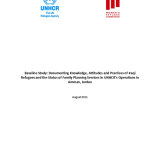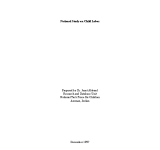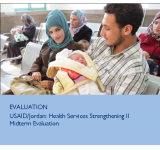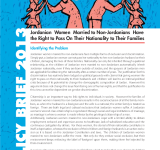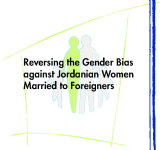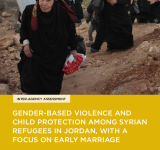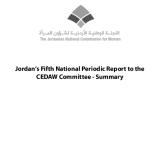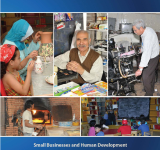child
This report analyzes the nature of child labor in Jordan. Child labor is defined as “the active participation of any child less than 16 years of age in any economic activity;; regardless of the type of work;; the employer;; the nature of the job;; or the activity.” This report examines the magnitude of child labor in Jordan based on the existing information and the collection of additional field data (both qualitative and quantitative) on the causes;; conditions;; and consequences of child labor. This report also aims to identify sub-populations of children most at risk to child labor;; investigate inadequacies in Jordanian laws and legislation with regards to child labor;; and examine vocational training programs and existing non-formal education programs for school drop-outs in relation to child labor. With regards to methodology;; information on child labor in Jordan was obtained through both primary and secondary sources;; including previous studies;; interviews;; and a field survey. After careful analysis;; this report makes a number of recommendations which aim to combat illegal of harmful child labor in Jordan.
The report presents the findings;; conclusions and recommendations of a midterm evaluation of Health Systems Strengthening (HSS) II;; a five year (2009-2014);; $73 million USAID-funded project. The strategy of the HSS II is to institutionalize strengthened health systems in support of reduced fertility rates and improved women's health. It works with the public health sector;; namely the Ministry of Health;; the Royal Medical Service and the Jordan University Hospital. The report finds that the project has met 13 of its 23 targets for year 3 and is on track to meet all its objectives by the end of the project. Expected results are public sector initiatives in safe motherhood and reproductive health. The HSS II project;; with its close ties with the Ministry of Health for its responsiveness to health needs and integrated approach to health delivery;; has strengthened critical health systems through its support to health management information system;; renovations;; accreditation;; referrals and capacity-building. The report recommends the USAID to negotiate the removal of a requirement that midwives be supervised intrauterine device insertion;; advocate for innovative incentive schemes and varying salary grades that reward midwives and doctors providing FP services and revise project indicators to reflect health outcomes and impact. Further recommendations include continuing support of a broad-scale mass media behavior change and communication campaign and programs that build on gains in maternal and neonatal health.
يتناول موجز السياسات هذا قضية النساء الأردنيات المتزوجات من رجال غير أردنيين واعطائهن الجنسية لعائلاتهن;; حيث يعرض المشكلة والنتائج المترتبة على كل من الزوجة والأبناء والعائلة في حال عدم الحصول على الجنسية;; وكما تناول موقف القانون الدولي من حق المرأة بمنح جنسيتها لأفراد عائلتها وذلك إلى جانب التناقض الموجود في التشريعات الأردنية;; بالاضافة إلى عرض الصعوبات الاقتصادية من جراء عدم التجنيس. وكما تناول الاسئلة الأكثر تكراراً;; وانتهى بتقديم مجموعة من التوصيات موجة لكل من مجلس الأمة والسلطة التنفيذية.
تهدف هذه الدراسة إلى الكشف عن التحديات التي تواجه النساء الأردنيات المتزوجات من رجال غير أردنيين وأبناءهن أيضاً. وتشمل الدراسة على تحلييل التكاليف والمنافع المترتبة على منح الإقامة والحقوق المدنية لهذه الفئة;; وذلك بهدف توفير صورة دقيقة لصانعي القرار لمعالجة غياب المساواة من وجهة نظر اقتصادية. وبشكل منفصل تسلط الدراسة الضوء على أثر حرمان أبناء تلك الأسر من هذه الحقوق;; وتحديداً ما يتعلق في شعورهم بالإنتماء. وكانت منهجية الدراسة مزيجاً من البحثين النوعي والكمي. وبلغ حجم العينة في المسح الكمي 230 رجل أردني متزوج من امرأة غير أردنية;; و210 امرأة أردنية متزوجة من رجل غير أردني في كل من: الزرقاء;; العقبة;; سحاب;; مادبا البلقاء.
The report aims to address the particular needs and cultural dynamics of Syrian refugees residing in Jordan;; especially with regards gender-based violence and child protection issues. It presents a comprehensive range of perspectives from urban Syrian refugees and local Jordanian decision makers in government;; community-based organizations and the religious and education sectors. The assessment of this report is based on data collected through three methodologies including questionnaire survey to refugees outside the Za’atari refugee camp;; focus group discussions in regions across Jordan and in-depth interviews. Key findings of the report are 1. The rates of early marriage are high;; 2. A significant percentage of children contribute to the household’s income and 3. Restrictions on women and girls’ mobility constrain their participation in social and economic activities and access to basic services. The report recommends measures to prevent acts of sexual exploitation and abuse and ensure the needs of the most vulnerable members of the Syrian refugee population in the cities.
هذا التقرير يستعرض جميع السياسات والتشريعات والممارسات والاجراءات الوطنية لبيان مدى اتفاقها مع الالتزامات المبنية في اتفاقية القضاء على جميع اشكال التمييز ضد المرأة;; بالاضافة إلى القاء الضوء على مساهمة المرأة في التنمية السياسية والاقتصادية والاجماعية. اضافة إلى ذلك;; فإن هذا الملخص يعرض الانجازات والتحديات ذات الصلة بحقوق المراة في مجال المساواة وعدم التمييز التي وردت في التقرير على صعيد: المشاركة في الحياة العامة;; محور التشريعات ;; محور الأمن البشري والحماية الاجتماعية;; ومحور التمكين الاقتصادي;; ومحور الاعلام.
This report explores the role of Small and Medium-Enterprises (SME);; as an agent for sustainable human development in Jordan. It analyzes SMEs and their contribution to human development using fours key central pillars of human development;; namely: economic growth that is equitable and pro-poor;; social progress;; participation and empowerment through micro finance;; and environmental sustainability. The report analyses the link between SMEs and empowerment or lack thereof;; with a specific focus on the two issues of employment;; as a tool for empowerment;; and the capacity of SMEs to enhance the position of women within the workforce and home. The report findings were based on extensive research;; a survey of 1;;500 firms and focus groups discussions conducted across the governorates of Jordan. The report proposed general recommendations in terms of institutional coordination;; exports;; cluster groups;; quality standard;; government monitoring;; tax law;; local development;; youth empowerment and the increase of minimum wage.
